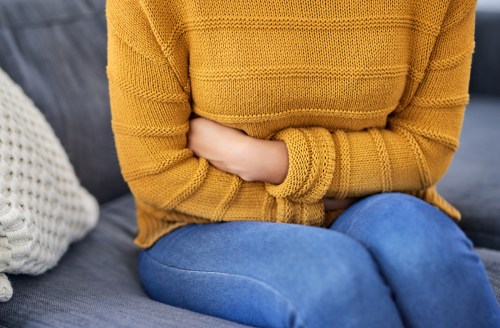Our editors independently select these products. Making a purchase through our links may earn Well+Good a commission
I got my period on April 14. Other than not wanting to go to a potentially crowded drugstore for tampons and instead doing that thing where you root around every handbag you own to find one measly OB, it was business as usual—which for me means pretty heavy and lasting around six days.
In the middle of the night of April 30, I, half-asleep, felt a wetness in my bed. I figured maybe I’d peed a little, because that sometimes happens when I take a sleep aid. (They knock me out cold, so when my body’s nudging me to get up and go to the bathroom, I can miss the memo.) But when I woke up in the morning, I saw that the wetness was blood, and not from light spotting that can happen mid-cycle, or spotting before periods. It was more like did-I-have-a-knife-fight-in-my-sleep? blood. The next day, the bleeding had stopped. I don’t usually get PMS, but on May 9 and 10, I was having back pain, cramps and headaches. When I woke up on May 11, I had my period again.
Confused, I took to Facebook to ask if any friends had had irregular periods since going into lockdown. Aside from a few hilarious jokes from men (“Nope, I’m pretty regular!”), my comments section quickly filled up with yeses.
Jessica P., a 34-year-old producer, tells me, “My period is usually long but with no PMS symptoms. Now it’s horrific. I’m getting extreme migraines, bloating and spotting in between.” Ruth, a 32-year-old writer, got her period three days after finishing her previous one. Joey, a 46-year-old writer/editor who is never irregular, was 10 days late.
“I feel like my body is dying inside,” says Jessica L., 32. As a fitness instructor, pre-COVID-19 she taught six to eight classes a week, “plus general movement,” she says, “like walking up and down subway stairs, which really does ease my symptoms. Now I feel like a blob who has sunken into my couch; I feel angry and ready to fight and also ready to weep at any moment.”
The funky quarantine periods revelation might have been surprising to me, but wasn’t a surprise to functional nutritionist and women’s hormone expert Alisa Vitti, founder of FLO Living and author of In the Flo: Unlock Your Hormonal Advantage and Unlock Your Life. “Back in mid-March I started putting out the PSA to let women know that this was likely going to be a problem and why…I could see it coming.”
Why quarantine stress wreaks havoc on your period
Basically, abnormal quarantine periods come down to the body’s infradian rhythm and how it responds to stress, Vitti says. Infradian rhythms are a rhythm or cycle that lasts longer than 24 hours (unlike the circadian rhythm, the 24-hour cycle aligned with the sun’s movements that governs most of your body’s processes). The most common example of an infradian rhythm is, well, your menstrual cycle, and it’s pretty important. “[Your infradian rhythm] governs brain function, immune response, the stress-response system, the microbiome, the reproductive system and your metabolism,” she says, and “your stress-response system naturally shifts during your cycle,” she says. But introduce a lot of stress at once, and it can throw your whole cycle out of whack.
How, exactly? Mary Jane Minkin, MD, a practicing OB/GYN and professor at Yale School of Medicine, says that our period is part of an interlocking network that “goes kablooey” when stress is introduced. The sex hormones estrogen and progesterone, which manage different parts of your menstrual cycle, are produced in the ovaries. The ovaries get their marching orders from the pituitary gland, which control ovulation and other functions critical to mensuration with the timed release of follicle-stimulating hormone (FSH) and luteinizing hormone (LH). The hypothalamus, at the base of the brain, controls the pituitary gland with its own hormones. Thus, anything that impacts the brain can have a trickle-down effect onto the rest of the body, including your cycle.
When you’re stressed, the body releases the stress hormone cortisol as part of its fight-or-flight response. Too much cortisol for long periods of time can have a “dampening effect” downstream and “this regular, intricate cycling goes to pieces,” says Dr. Minkin. Cortisol tamps down the production of the hormone GnH, which the hypothalamus uses to control the pituitary gland; not enough GnH and the pituitary gland doesn’t know to make FSH or LH to control ovulation; without those hormonal signals, the ovaries don’t function properly, and thus your periods are thrown out of whack, leading to irregular, strange periods and other hormonal shifts. Kablooey.
Thinking of our bodies this way—as one astounding Rube Goldberg contraption—it seems obvious that stress would be disruptive. And what has been more stressful in recent memory than this exact time period? Think about the state of the world right now—we’re battling a once-in-a-lifetime pandemic that has no current cure or vaccine, facing an economic downturn on par with the Great Depression, and are expected to take care of our kids (and school them) while trying to do our full-time jobs from home (if we still have a job at all). Experts predict that the pandemic will take a big toll on Americans’ mental health, and in turn, the increased stress will likely mess with how we experience our periods.
“There are people who can suppress feelings of fear, weakness, and vulnerability. But even if they’re able to do that subjectively in their minds and not experience their feelings, their bodies still will. Those people sometimes handle stress better—they’re survival skills from trauma and other things—but the body…can’t hide that,” says Jennifer Berman, MD, a urologist and sexual health expert.
Compounding the issue is the fact that due to necessary social distancing measures, most of us are cut off from physical contact with loved ones—which is in itself a form of stress, says Dr. Berman. “We are wired as human beings to connect with other people, and when we’re ripped of that, it’s hard for us to survive.”
How to get back to (relative) normal
So now that we know what’s going on—stress can cause an irregular period, and an irregular period can cause more stress—what do we do? For starters, don’t panic, says Dr. Berman; instead, think of your period as a clear sign that you need to address your stress. “[Your period is] a symptom of what you’re thinking, feeling and doing,” she says. “So if you want things to go back to normal, start thinking, feeling and being whatever normal is to you.”
Vitti’s plan for mastering your period could (and does!) fill books, but some simple stress-reducing activities to lower your cortisol levels and bring things back to normal include 15 minutes of jumping on a mini trampoline or dancing, she says. It’s also worth worth exploring other stress-reducing practices, like EFT tapping, breathing exercises (or alternatives if they’re not your thing), meditation, etc.
“Sexual stimulation, arousal, and orgasm is a very good way to release stress,” adds Dr. Berman. “It doesn’t have to be through masturbation, it doesn’t have to be with or without a vibrator, it doesn’t have to be on your own, it can be with a partner,” she says. “In fact, I would say it’s better with someone you care about and love because of the connection aspect. But sex is a great way to reduce stress.”
If your quarantine period feels like it’s unmanageable, is particularly heinous (e.g. extremely painful cramps, or out-of-the-ordinary symptoms), or you’re worried that there’s something bigger than stress at play, definitely call up your OB/GYN. “This is one situation that is actually fairly amenable to talking about on the phone,” says Dr. Minkin. You can chat through issues and options together and come up with the right treatment plan for you.
The good news: Quarantine periods, while funky and terrible, are expected and not something to be super freaked out by. “The upside is, we are all connected,” says Dr. Berman. “There’s light at the end of the tunnel. This is a reminder and wake-up call and a way to learn how to manage stress. This is a crash course.”
Hearing that truly does help, at least for me. Maybe we can’t control our periods—or the world—right now, but at least we can take comfort in knowing that we’re not alone. We are the Sisterhood of the (Time-)Traveling Period, and everything’s going to be okay.
Sign Up for Our Daily Newsletter
Get all the latest in wellness, trends, food, fitness, beauty, and more delivered right to your inbox.
Got it, you've been added to our email list.











